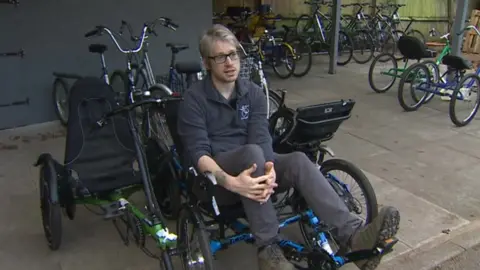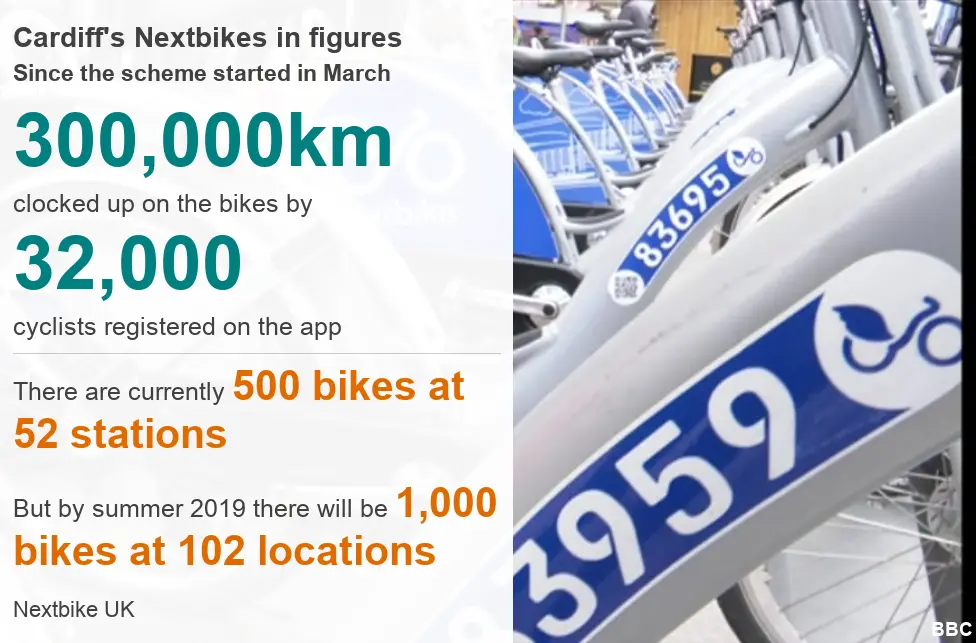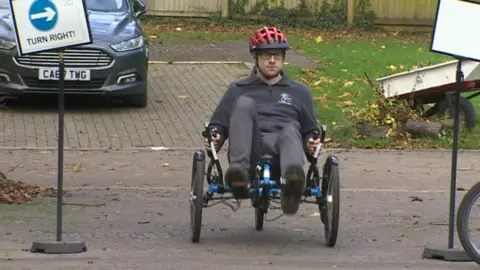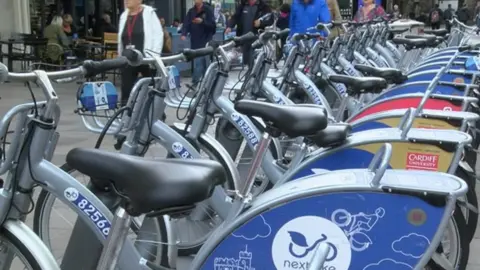Bikes for disabled people in Cardiff Nextbike share scheme plan
 BBC
BBCPeople with disabilities will be able to hire specially adapted bikes around Cardiff via an app as a public cycle share scheme expands across the city.
By this summer, 1,000 Nextbikes are set to be docked around the capital, double the number already on the streets.
Kevin Rahman-Daultrey, who has dyspraxia, said he would not be able to cycle without an adapted trike.
But while the scheme is popular, Cardiff council has admitted city cycle routes must be improved.
Introduced in March, the blue bikes have become a common sight dotted around the streets of Cardiff, with more than 32,000 cyclists using them to travel around the city.

From starting with just 50 bikes at five locations, it is hoped there will be 1,000 bikes on the streets by the summer.
As part of its expansion plans, Nextbike want to give disabled people greater access to specially adapted bikes.
While the final details are not yet clear, the company hope the specialist bikes will be able to be booked via the app and customer services, with people able to give details of their disability in order to get a bike tailored to their needs.
UK Nextbike managing director Julian Scriven said he wanted to make cycling in Cardiff as accessible as possible.
The company also hopes to introduce a subsidised membership which would be offered to riders from poorer backgrounds to encourage cycling in 2019.

Kevin Rahman-Daultrey has a severe form of dyspraxia, a co-ordination disorder, and said he would not be able to balance on a two wheel bike.
He works for Wales' largest cycling charity, Pedal Power, based in Pontcanna, which is responsible for repairing and re-distributing the Nextbikes in Cardiff and which is looking to expand to other sites across the city.
The company mostly repairs punctures but had come across incidents of minor vandalism on the shared bikes.
It has its own fleet of specially adapted cycles which Nextbike will be utilising as part of their expansion plans.
Mr Rahman-Daultrey rides a recumbent trike, which is also used by people with cerebral palsy or who have had strokes.
"For me this bike enables me to cycle in the same way and the same places that a two wheel bike would be able to," he said.
"Without a bike like this I wouldn't be able to cycle."

Backed by Cardiff council and supported by the Welsh Government, Nextbikes were introduced to reduce congestion, free up parking spaces and to provide a healthier way to travel around the capital.
But BBC Wales spoke to people in Cardiff who had concerns about how safe the roads were for cycling in the city.
One man said the cycle lanes in the capital were "awful and very very dangerous", while another, who cycles along Newport Road into the city, said it was "a bit hairy" competing with the cars and buses.
Councillor Caro Wild, cabinet member for transport, who cycles around the city, said Cardiff was not designed for cycling and the council was not shying away from the fact that improvements needed to be made.
"There's lots of little things happening around junction changes and 20 miles an hour zones," he said.
"But the biggest thing we'll be looking to do is to introduce new cycle superhighways which are fully segregated cycle lanes on some of the key routes taking people to work and university."
He said it was hoped work would start in the new year, and that the public would be asked where they would like to see the Nextbikes located.
